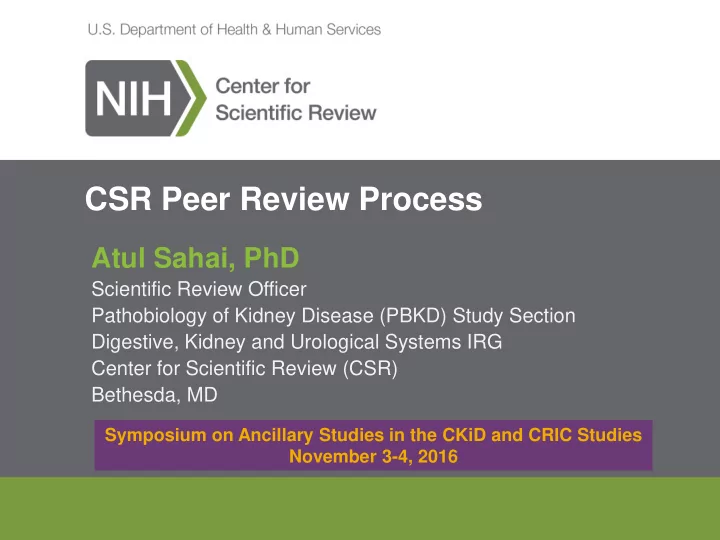

CSR Peer Review Process Atul Sahai, PhD Scientific Review Officer Pathobiology of Kidney Disease (PBKD) Study Section Digestive, Kidney and Urological Systems IRG Center for Scientific Review (CSR) Bethesda, MD Symposium on Ancillary Studies in the CKiD and CRIC Studies November 3-4, 2016
Division of Physiological and Pathological Sciences Study Sections Integrated Review Groups • Clinical, Integrative and Molecular Gastroenterology (IRGs) Study Section [CIMG] • Gastrointestinal Mucosal Pathobiology Study Section Endocrinology, Metabolism, [GMPB] Nutrition & Reproductive • Hepatobiliary Pathophysiology Study Section [HBPP] Sci. • Kidney Molecular Biology and Genitourinary Organ Infectious Diseases and Development Study Section [KMBD] • Pathobiology of Kidney Disease Study Section Microbiology [PBKD] Digestive, Kidney and • Systemic Injury by Environmental Exposure [SIEE] Urological Systems • Xenobiotic and Nutrient Disposition and Action Study Section [XNDA] Immunology • Urologic and Genitourinary Physiology and Pathology Special Emphasis Panel[DKUS R (90) S] • Digestive Sciences Small Business Activities [SBIR/STTR] Special Emphasis Panel [DKUS (10)] • Renal and Urological Sciences Small Business Activities [SBIR/STTR] Special Emphasis Panel [DKUS (11)]
Peer Review and Funding of NIH Grant Applications CSR (PA-16-160) DK (PAR-16-034)
New NIH Policy: Rigor and Transparency in Research To support the highest quality science, public accountability, and social responsibility in the conduct of science , NIH’s Rigor and Transparency efforts are intended to clarify expectations and highlight attention to four areas that may need more explicit attention by applicants and reviewers: Scientific premise Scientific rigor Consideration of relevant biological variables, such as sex Authentication of key biological and/or chemical resources
What Reviewers Look for in Applications • Significance and impact • Exciting ideas • Clarity • Ideas they can understand -- Don’t assume too much • Realistic aims and timelines -- Don’t be overly ambitious • Brevity with things that everybody knows • Noted limitations of the study • A clean, well-written application
Common Problems in Applications • Lack of new or original ideas • Absence of an acceptable scientific rationale • Lack of experience in the essential methodology • Questionable reasoning in experimental approach • Uncritical approach • Diffuse, superficial, or unfocused research plan • Lack of sufficient experimental detail • Lack of knowledge of published relevant work • Unrealistically large amount of work • Uncertainty concerning future directions
Recommend
More recommend